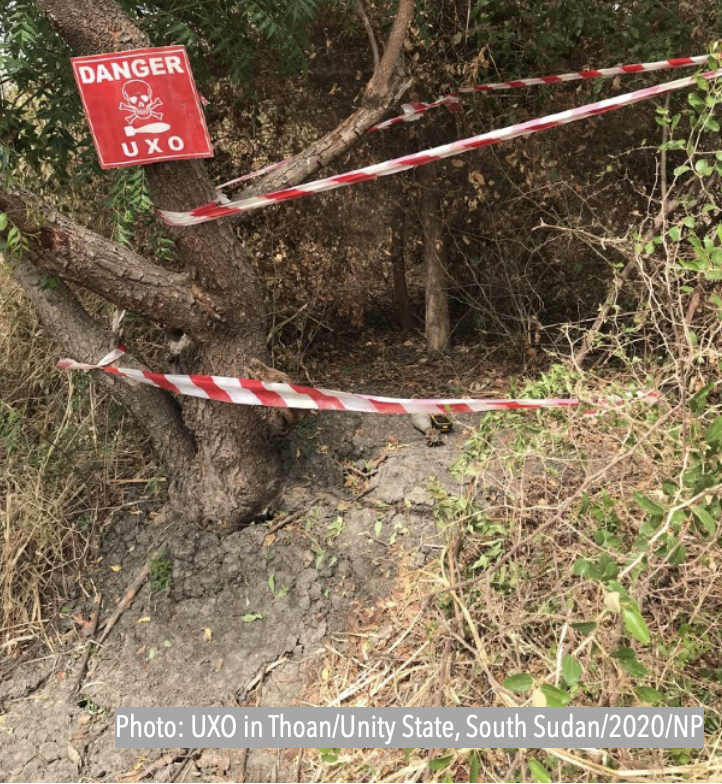Protecting Civilians from Unexploded Ordinance through Community Engagement and Humanitarian Coordination

When South Sudan descended into civil war in late 2013, Unity State became a hotspot for hostilities with heavy weapons used by all parties to the conflict. By the time the signing of the Revitalized Agreement on the Resolution of the Conflict in the Republic of South Sudan (R-ARCSS) halted the heavy fighting in late 2018, large territories of Unity State were littered with unexploded ordinances (UXOs). During the rainy season, UXOs are buried deep in muddy soil, posing hidden dangers to local communities. When the rainy season is over, blistering sun dries and cracks the soil, exposing shells, bombs, mines and other munitions, reminding civilians that their safety is still in peril.
In early April 2020, anticipating the approach of the rainy season, farmers of Thoan went to plant their fields with corn and other vegetables only to discover UXOs laying uncovered on the surface of their plots. Thoan, a settlement comprised of approximately 30 households, is located in close proximity to the bridge between Rubkona and Bentiu towns, and served as a strategic military area where government soldiers were stationed during the war. Currently, the barracks are abandoned and returnees from Sudan and Uganda have been moving back into the area, taking advantage of the abandoned infrastructure and the proximity of the river to enable agricultural.
Finding and Diffusing UXOs
In April 2020, NP learned that inter-communal violence and instances of cattle raiding had been disturbing the lives of civilians in the county. Observing that only a few NGOs had interacted with the communities in Thoan, NP’s Beyond Bentiu Response (BBR) team conducted a patrol in Thoan to establish a relationship with the returnees and assess protection concerns as the newly formed settlement was also in close proximity to a cattle camp.
While speaking to a woman from the community who was occupying an abandoned metal corrugated container, during a patrol, the team noticed a pile of bullet casings beside her shelter. The team asked where the bullets came from and the woman said that children from the nearby cattle camp found them. The team asked where these children could be found and were promptly introduced.
The children received permission from their parents to accompany NP to the location where they found the bullets. After a twenty-minute walk, the team came to an area where rocket-propelled grenade (RPG) shells and bullets could be seen on the ground. The team thanked the children and explained to them that they must never touch UXOs, never approach any objects they could not readily identify, and always inform an adult if they observe anything suspicious.
Once NP ensured that children were in a safe distance from the UXOs, BBR team carefully marked the area, recorded GPS coordinates of the location, and promptly passed the information to the United Nations Mine Action Service (UNMAS). Before departing the area, NP also shared UNMAS’ contact information with the community members enabling them to report UXOs directly to UNMAS should there be a need in the future.
After NP shared the GPS coordinates, UNMAS contacted NP to request accompaniment to the identified location to clear the ordinance. At the site, UNMAS studied the UXOs and determined that some of the RPG shells could not be moved and should be cleared on the spot. This, however, required prior approval from South Sudan People’s Defense Force (SSPDF) and could not occur on the same day. In the meantime, while waiting for SSPDF clearance, UNMAS cordoned the area off with tape and installed danger signs to ensure the safety of the local community. Four days later, UNMAS was granted permission to diffuse the UXOs and the area was safely cleared.
Education for Safety
The BBR team returned to Thoan to sensitize the community on the dangers of and required actions when identifying UXO, thereby responding to the immediate needs of the community. NP met with community leaders to propose a session on a danger of small arms and light weapons (SALW) and ask for support in mobilizing the community for the training. On 5 May 2020, 20 women and men attended a SALW session and shared their new knowledge and learnings with fellow community members.
Later that same month, the BBR team discovered more UXOs in another location. While patrolling the Bentiu - Nhialdiu Road NP staff were approached by a charcoal maker who notified the team about UXOs he discovered in the bush. The man said he picked up one of the UXOs and took it back to his temporary charcoal camp. Alarmed by this news, the team asked if the man could show them to the charcoal camp. Moments later, the charcoal maker walked the BBR team into the bush and indicated the UXO’s location, less than two meters from where the charcoal maker slept. The team recorded GPS coordinates and sent the information to UNMAS with a message explaining the situation. Several hours later, UNMAS, accompanied by NP staff, arrived at the site and removed the UXO.
A Long Road Ahead
As de-mining is a slow and costly process, it may take years, even decades, before the people of Unity State will be safe on their land. Therefore, coordinating and sharing information with relevant actors to address mine risk education and practice of safe behavior are critical, not only for the present generation but for future generations as well, in the prevention of UXO-related incidents and deaths.
Going forward, NP will continue raising awareness on the dangers of SALWs and cooperating with UNMAS when appropriate. Further, NP is planning to cooperate with a local humanitarian organization certified in mine risk education, supporting and amplifying its actions through hotspot mapping, and early warning and early response training.
